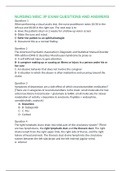NURSING MISC 3P EXAM QUESTIONS AND ANSWERS
Questions 1
When performing a visual acuity test, the nurse practitioner notes 20/30 in the
left eye and 20/60 in the right eye. The next step is to
A- Have the patient return in 2 weeks for a follow-up vision screen
B- Dilate the eyes and retest
C- Refer the patient to an ophthalmologist
D- Document this as a normal finding.
Question 2
The American Psychiatric Association’s Diagnostic and Statistical Manual Disorder
fifth edition (DMS-5) describes Munchausen Syndrome by proxy as
A- A self-inflicted injury to gain attention
B- A caregiver making up or causing an illness or injury in a person under his or
her care
C- An abusive behavior that does not involve the caregiver
D- A situation in which the abuser is often inattentive and uncaring toward the
victim
Question 3
Symptoms of depression are a side effect of which neurotransmitter medication?
[There are 3 categories of neurotransmitters in the brain: small molecules for fast
action/excitatory transmission = glutamate & GABA; small molecules for slower
modulation of activity = dopamine & serotonin; Peptides = endorphins,
cannabindoids, oxytocin)
A- Dopamine
B- B- Gabapentin
C- C- Mu
D- Cortisol
Question 4
The right lymphatic ducts drain into what part of the circulatory system? (There
are two lymph ducts, the right lymphatic duct and the thoracic duct. The right
drains lymph from the right upper limb, the right side of thorax, and the right
halves of head and neck. The thoracic duct drains lymph into the circulatory
system between the left subclavian and the left internal jugular veins)
A- Arterial
,B- Venous
C- Arteriovenous system
D- Capillary bed
Question 5
Which lesion is dark, raised and asymmetric with irregular borders?
A- Nevus (the medical term for a mole. Nevi are very common. Most people have
between 10 and 40. Common nevi are harmless collections of colored cells. They
typically appear as small brown, tan, or pink spots)
B- Actinic (a rough, scaly patch on your skin that develops from years of exposure
to the sun. It's most commonly found on your face, lips, ears, back of your hands,
forearms, scalp or neck)
C- Keratoacanthoma (a dome-shaped lump or tumor that grows on your skin)
D- Melanoma (the most serious type of skin cancer, develops in the cells
(melanocytes) that produce melanin — the pigment that gives your skin its
color. Melanoma is asymmetric, irregular border, change in color, change in
diameter, and evolved over time [ABCDE])
Question 6
A pediatric patient has areas of scaling on the scalp, with round patches of
alopecia. This clinical finding is consistent with
A- Tinea capitis (Ringworm of the scalp is not really a worm, but a fungal
infection. It gets the name ringworm because the fungus makes circular marks
on the skin, often with flat centers and raised borders. Also called Tinea capitis,
this infection affects your scalp and hair shafts, causing small patches of itchy,
scaly skin)
B- Seborrheic dermatitis (a common skin condition that mainly affects your scalp.
It causes scaly patches, red skin and stubborn dandruff. Seborrheic dermatitis can
also affect oily areas of the body, such as the face, sides of the nose, eyebrows,
ears, eyelids and chest. For infants, the condition is known as cradle cap and
causes crusty, scaly patches on the scalp.)
C- Trichotillomania (hair-pulling disorder, is a mental disorder that involves
recurrent, irresistible urges to pull out hair from your scalp, eyebrows or other
areas of your body, despite trying to stop)
, D - Alopecia areata (a condition that causes hair to fall out in small patches, which
can be unnoticeable. These patches may connect, however, and then become
noticeable. The condition develops when the immune system attacks the hair
follicles, resulting in hair loss)
Question 7
A patient with an acute presentation of acute aortic regurgitation (AR) typically
presents with sudden severe shortness of breath, lower extremity edema, a rapid
heartbeat, and
A- Dry mouth
B- Chest pain
C- Decreased blood pressure
E - Systolic murmur
Question 8
Which of the following conditions is associated with chronic bloody diarrhea?
A- Irritable bowel syndrome (a common disorder that affects the large intestine.
Signs and symptoms include cramping, abdominal pain, bloating, gas, and
diarrhea or constipation, or both. IBS is a chronic condition that you'll need to
manage long term)
B- Crohn’s disease (an inflammatory bowel disease (IBD). It causes inflammation
of your digestive tract, which can lead to abdominal pain, severe diarrhea,
blood in stool, fatigue, weight loss and malnutrition)
C- Hepatitis A (Hepatitis A is a highly contagious liver infection caused by the
hepatitis A virus. You're most likely to get hepatitis A from contaminated food or
water or from close contact with a person or object that's infected.signs and
symptoms can include:Fatigue, Sudden nausea and vomiting, Abdominal pain or
discomfort, especially on the upper right side beneath your lower ribs (by your
liver), Clay-colored bowel movements, Loss of appetite, Low-grade fever, Dark
urine, Joint pain, Yellowing of the skin and the whites of your eyes (jaundice),
Intense itching)
D- Celiac disease (an immune reaction to eating gluten, a protein found in wheat,
barley and rye.Over time, this reaction damages your small intestine's lining and
prevents it from absorbing some nutrients (malabsorption). The intestinal damage
often causes diarrhea, fatigue, weight loss, bloating and anemia, and can lead to
serious complications)




